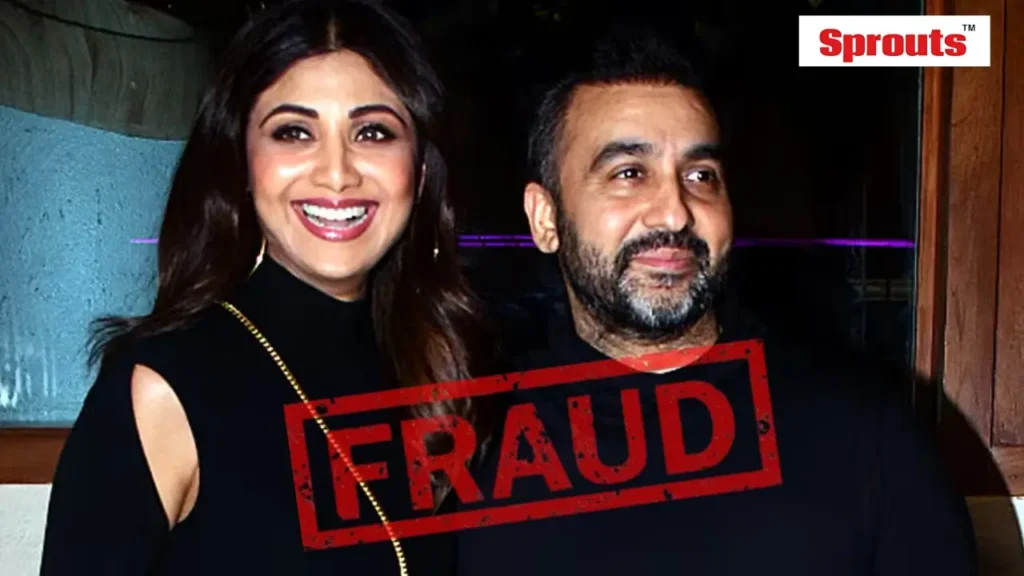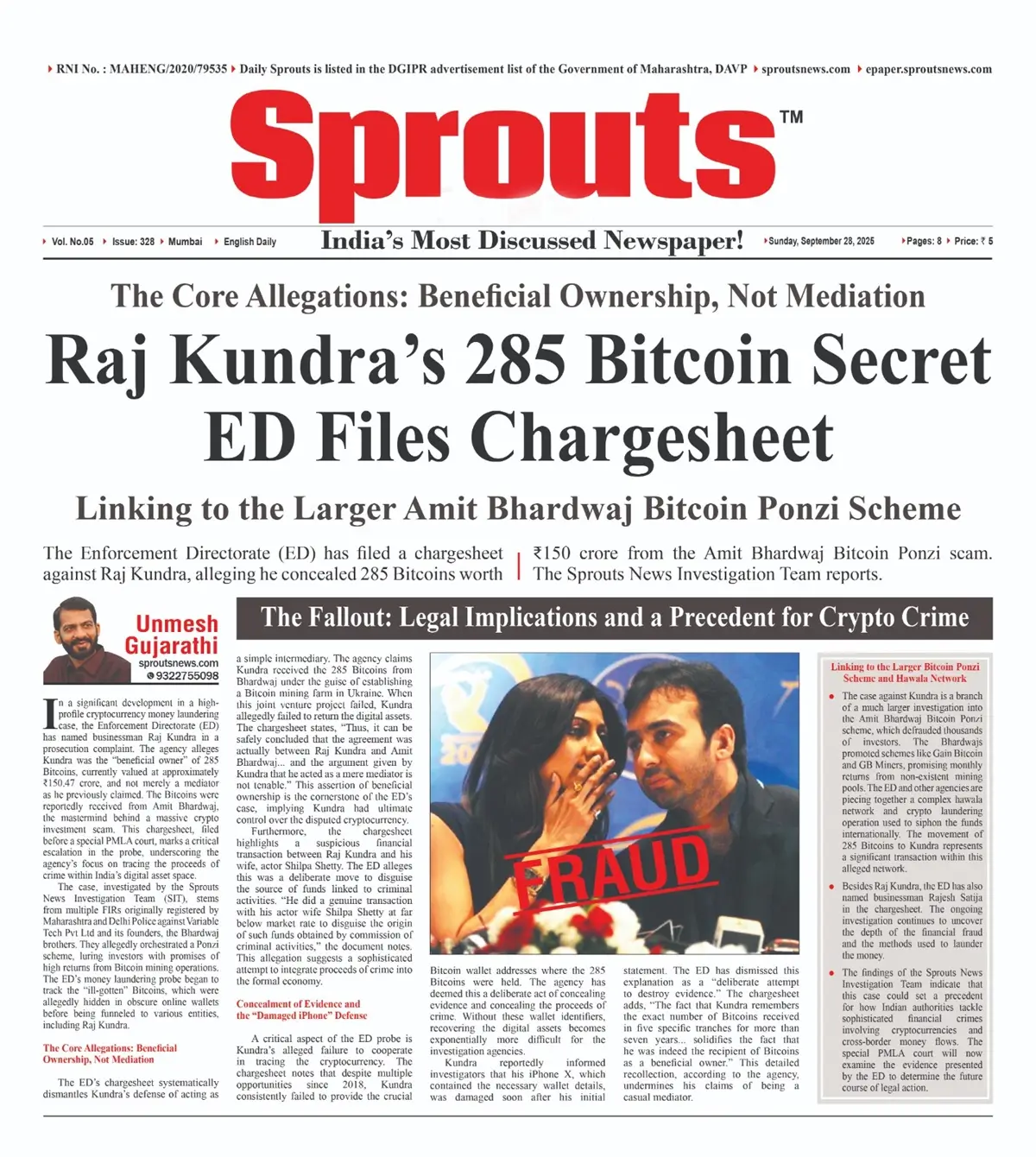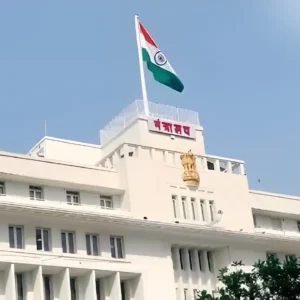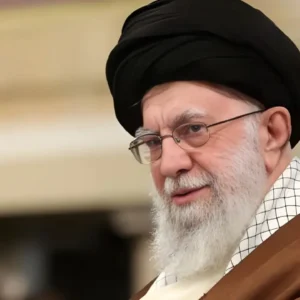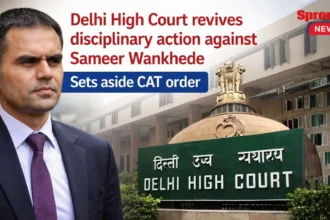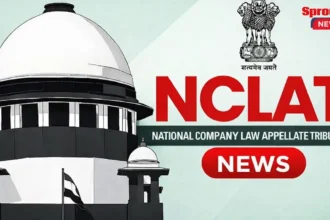Raj Kundra Named in ED Chargesheet as Beneficial Owner of 285 Bitcoins in ₹150 Cr Money Laundering Case
• The Core Allegations: Beneficial Ownership, Not Mediation
• Linking to the Larger Amit Bhardwaj Bitcoin Ponzi Scheme
• The Fallout: Legal Implications and a Precedent for Crypto Crime
The Enforcement Directorate (ED) has filed a chargesheet against Raj Kundra, alleging he concealed 285 Bitcoins worth ₹150 crore from the Amit Bhardwaj Bitcoin Ponzi scam. The case highlights India’s growing crackdown on crypto-linked money laundering. The Sprouts News Investigation Team reports.
- Raj Kundra Named in ED Chargesheet as Beneficial Owner of 285 Bitcoins in ₹150 Cr Money Laundering Case
- • The Core Allegations: Beneficial Ownership, Not Mediation
- • Linking to the Larger Amit Bhardwaj Bitcoin Ponzi Scheme
- • The Fallout: Legal Implications and a Precedent for Crypto Crime
- The Core Allegations: Beneficial Ownership, Not Mediation
- Concealment of Evidence and the “Damaged iPhone” Defense
- Raj Kundra Linking to the Larger Bitcoin Ponzi Scheme and Hawala Network
In a significant development in a high-profile cryptocurrency money laundering case, the Enforcement Directorate (ED) has named businessman Raj Kundra in a prosecution complaint. The agency alleges Kundra was the “beneficial owner” of 285 Bitcoins, currently valued at approximately ₹150.47 crore, and not merely a mediator as he previously claimed. The Bitcoins were reportedly received from Amit Bhardwaj, the mastermind behind a massive crypto investment scam. This chargesheet, filed before a special PMLA court, marks a critical escalation in the probe, underscoring the agency’s focus on tracing the proceeds of crime within India’s digital asset space.
Click Here To Download the News Attachment
The case, investigated by the Sprouts News Investigation Team (SIT), stems from multiple FIRs originally registered by Maharashtra and Delhi Police against Variable Tech Pvt Ltd and its founders, the Bhardwaj brothers. They allegedly orchestrated a Ponzi scheme, luring investors with promises of high returns from Bitcoin mining operations. The ED’s money laundering probe began to track the “ill-gotten” Bitcoins, which were allegedly hidden in obscure online wallets before being funneled to various entities, including Raj Kundra.
The Core Allegations: Beneficial Ownership, Not Mediation
The ED’s chargesheet systematically dismantles Kundra’s defense of acting as a simple intermediary. The agency claims Kundra received the 285 Bitcoins from Bhardwaj under the guise of establishing a Bitcoin mining farm in Ukraine. When this joint venture project failed, Kundra allegedly failed to return the digital assets. The chargesheet states, “Thus, it can be safely concluded that the agreement was actually between Raj Kundra and Amit Bhardwaj… and the argument given by Kundra that he acted as a mere mediator is not tenable.” This assertion of beneficial ownership is the cornerstone of the ED’s case, implying Kundra had ultimate control over the disputed cryptocurrency.
Furthermore, the chargesheet highlights a suspicious financial transaction between Raj Kundra and his wife, actor Shilpa Shetty. The ED alleges this was a deliberate move to disguise the source of funds linked to criminal activities. “He did a genuine transaction with his actor wife Shilpa Shetty at far below market rate to disguise the origin of such funds obtained by commission of criminal activities,” the document notes. This allegation suggests a sophisticated attempt to integrate proceeds of crime into the formal economy.
Also Read: JSW Steel Secures Bhushan Power in ₹19,700 Cr IBC Win.
Concealment of Evidence and the “Damaged iPhone” Defense
A critical aspect of the ED probe is Kundra’s alleged failure to cooperate in tracing the cryptocurrency. The chargesheet notes that despite multiple opportunities since 2018, Kundra consistently failed to provide the crucial Bitcoin wallet addresses where the 285 Bitcoins were held. The agency has deemed this a deliberate act of concealing evidence and concealing the proceeds of crime. Without these wallet identifiers, recovering the digital assets becomes exponentially more difficult for the investigation agencies.
Kundra reportedly informed investigators that his iPhone X, which contained the necessary wallet details, was damaged soon after his initial statement. The ED has dismissed this explanation as a “deliberate attempt to destroy evidence.” The chargesheet adds, “The fact that Kundra remembers the exact number of Bitcoins received in five specific tranches for more than seven years… solidifies the fact that he was indeed the recipient of Bitcoins as a beneficial owner.” This detailed recollection, according to the agency, undermines his claims of being a casual mediator.
Raj Kundra Linking to the Larger Bitcoin Ponzi Scheme and Hawala Network
The case against Kundra is a branch of a much larger investigation into the Amit Bhardwaj Bitcoin Ponzi scheme, which defrauded thousands of investors. The Bhardwajs promoted schemes like Gain Bitcoin and GB Miners, promising monthly returns from non-existent mining pools. The ED and other agencies are piecing together a complex hawala network and crypto laundering operation used to siphon the funds internationally. The movement of 285 Bitcoins to Kundra represents a significant transaction within this alleged network.
Besides Raj Kundra, the ED has also named businessman Rajesh Satija in the chargesheet. The ongoing investigation continues to uncover the depth of the financial fraud and the methods used to launder the money. The findings of the Sprouts News Investigation Team indicate that this case could set a precedent for how Indian authorities tackle sophisticated financial crimes involving cryptocurrencies and cross-border money flows. The special PMLA court will now examine the evidence presented by the ED to determine the future course of legal action.


